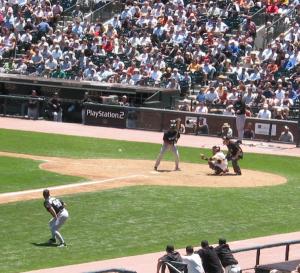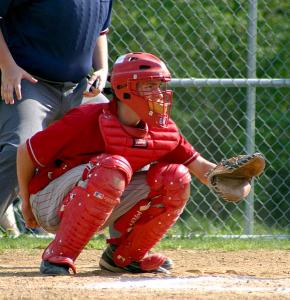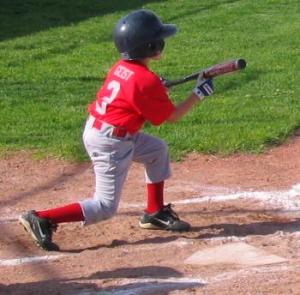 It has long been said that baseball is “America’s Game.” Frankly, I doubt that is true anymore, since the National Football League appears to have corralled the hearts and minds of countless sports fans. Personally, I used to watch professional football with an admiration tending toward religion, but in recent years I have backed away from that semi-controlled violence where massive men smash into one another with the goal of annihilating an opponent rather than merely defeating him. And with the rising crescendo of worries about significant brain injuries brought on by those constant assaults of one man on another, it has reduced the attraction of the sport significantly for me. When Hall- of-Famer Troy Aikman can announce that none of his own children should play football, the sport he became legendary playing, it ought to give anyone pause about the game.
It has long been said that baseball is “America’s Game.” Frankly, I doubt that is true anymore, since the National Football League appears to have corralled the hearts and minds of countless sports fans. Personally, I used to watch professional football with an admiration tending toward religion, but in recent years I have backed away from that semi-controlled violence where massive men smash into one another with the goal of annihilating an opponent rather than merely defeating him. And with the rising crescendo of worries about significant brain injuries brought on by those constant assaults of one man on another, it has reduced the attraction of the sport significantly for me. When Hall- of-Famer Troy Aikman can announce that none of his own children should play football, the sport he became legendary playing, it ought to give anyone pause about the game.
Baseball has always been my game. It takes great skill to play well, superior hand-eye coordination, speed, quickness, strong arms and wrists. What it does not take is huge size. My boyhood hero was Willie Mays, in my mind the greatest player who ever played the game, and Willie was barely 5’ 10” tall and weighed a mere 170 pounds. In other words, he was bit smaller than I am now, yet hit 660 homeruns, drove in 1903 runs, and won 12 gold gloves in center field in a 20+ year major league career. And he is still alive at age 87. It will be quite difficult to name an 87-year-old former football player; the wear and tear on the football body is simply too great. All of this is to say that I could identify with Willie Mays; I could play baseball, though hardly on his level, but I could as a normal sized boy play that game. The massive left guard for the Dallas Cowboys, Tyron Smith, is a mountainous 6’5” tall and weighs 320 pounds, the stuff of nightmares for defensive linemen and running backs, but not in any way a typical human being.
I happen to like baseball’s pace, though others find it unbearably slow. Games routinely take 3 hours or more to complete, since there are no time limits but only innings limits (9), unless of course the game goes into extra innings and must be played until someone scores a run or two. And if it is the visiting team that scores those extra inning runs, the home team still gets a chance to match that scoring. If they do not, the game is finally over. If you study baseball, and it is a game well worth studying, there is a vast amount of strategy and positioning happening on every play, every pitch. I have played and watched the game long enough to observe these subtle actions, and thus for me the game is almost unbearably exciting for much of the time.
And the game is so clean, so fresh, so well ordered. The 90’ baselines are just long enough to make plays at first base very close for fast runners who hit ground balls to the shortstop, quite close for runners trying to steal second base, some 127’ from home to second, requiring a strong-armed catcher to make almost a perfect throw to get the runner out. The 60’6” distance from the pitcher’s rubber to home plate is just right to make a 95- mile per-hour fastball hittable for the swift of wrist and eye, but nearly untouchable for the weaker hitter. The advantage moves back and forth between pitcher and hitter for nearly the entire game, given this optimum distance.
Well, I could go on about the intricacies of baseball, but I am sure you are wondering what any of this jargon has to do with theology and preaching. I think preaching is a lot like baseball. It takes time to prepare well, and it takes great skill and careful attention to the facets of the task to perform well. Proper pacing is crucial to a fine sermon as it is for an exciting game. The sermon, like the baseball diamond, must be well designed, containing the right elements for the game, while providing opportunities for freedom and imagination within that careful design. Sermons, like baseball games, must have an ending, but those endings may be either relatively predictable nine-inning ones, or may extend the gospel’s excitement into extra innings of reflection and challenge.
Baseball is a game of the mind as much as of the body. Its parameters are laid out clearly and historically, but within those parameters each player has the freedom to play with his own unique gifts and skills. Among those gifts is the ability to see beyond the immediate action, and to imagine what may happen with the batter who is coming up, or the batters who will stand at the plate in the next inning. In other words, in a baseball game, one is forever looking ahead, not fixed in last inning’s failures but anticipating the possible pleasures of innings still to come. In short, baseball is ever the game of hope; next time I will get a hit, next time I will strike out the other team’s star. Tomorrow we will win the game.
My long-time favorite team is the Texas Rangers. I lived in Dallas for over 40 years and found my way to Rangers’ stadium, and now Globe Life Park in Arlington, TX, as often as I could. And of course I watched them on TV regularly. For many years they were flat awful, the doormat of their division and the American League. Recently, for several shining seasons, two of which found them in the World Series, they were resolutely very good. In 2018 they are barely mediocre once again; it seems highly unlikely that they will escape last place in the western division of the American League. If they win 70 games of their 162, it will be something of a surprise. Still, there is always next year. My son and I have gone to Rangers’ spring training in Surprise, AZ for some 11 years now, and I hope we will go again in 2019. In spring training every team hopes to catch lightening in a bottle and find itself in the World Series. Well, watching this Rangers team this year in Arizona told me that that was hardly likely to happen in 2018. Yet, like the gospel, hope is the hallmark of every season. This year is and will be a poor one for my Rangers, but baseball offers hope and perhaps in two or three years, I may once again have a real chance to see them in a Series again.
Baseball is too often filled with failure. The very best of hitters, all-stars, only get hits 30% of the time. As a Christian, that 30% often summarizes my ability to fulfill the demands of the gospel on my life; truthfully, 30% may be far too high. But the gospel says I am an all-star still, and that with God’s continuous presence with me, I can always do and be better. And so it is in my preaching. 30% success may be about right, those times when my passion matches my preparation, my words’ clarity reaching the ears of some of my listeners. Baseball is for me metaphor for my life in the gospel, and for my life as a preacher. And so I will watch another game today, and another tomorrow, and each time I will think of hope and expectation and the possibility of that ultimate prize of the World Series ring, or in gospel terms “the upward calling of God in Jesus Christ.”
Images from Wikimedia Commons











